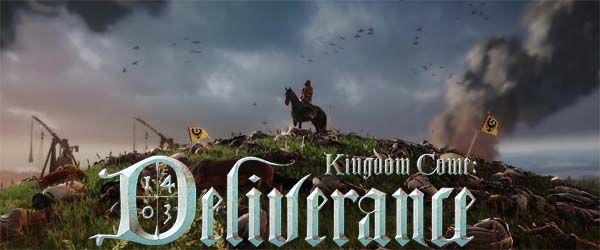
I tried. I really did. I wanted to give Kingdom Come: Deliverance a chance. I wanted to give it the benefit of the doubt.
I had been passively watching this game for a while, and was looking forward to its release. I didn't realize that it was a Kickstarter project. I thought it was just an independent developer self-publishing a game, like Hellblade: Senua's Sacrifice, which was friggin' awesome! So I didn't contribute towards the Kickstarter. But I did pay $60 for PS4 digital download of the game, and I deeply regret the decision.
If you're gonna charge the same retail price as a polished, publisher-backed game, then I expect the game to show something approaching that level of polish. Kingdom Come is just too wonky and unstable right now. Maybe in six or twelve months I might be able to pick it back up and enjoy it. As of now, however, I consider the game borderline unplayable.
Kingdom Come has ambitions to be Skyrim or The Witcher III, but it lacks the polish.
Scummy saves
The nail in the coffin is the game's restrictive and punitive save system. I'm a fan of diagetic save systems, and this particular save system could probably work really well if the game were just in a more stable and robust condition. I want to emphasize that this worked brilliantly in Resident Evil (and in survival horror in general) because the challenge and difficulty of survival horror came from having to manage a slowly dwindling supply of resources and health. Very few (if any) encounters outside of boss fights were even capable of bringing you from full health to dead, and even the boss fights were clearly telegraphed so that you had plenty of warning to go back, restock your supplies, and save. When to save (and whether or not to overwrite your previous save) became a part of strategy, especially in the case of Resident Evil with its limited,
inventory-space-consuming Ink Ribbons.
Reloading from savior schnapps makes you drunk.
Basically, Kingdom Come only auto-saves at the start of a major new quest. You can trigger a manual save by sleeping or by drinking a special type of rare and expensive alcoholic consumable. If you re-load after using the savior schnapps, the character is also inebriated. This seems, to me, to be an attempt to punish players for save-scumming. It also means that if you get tired or have to step away for whatever reason, and you didn't just complete a quest and are not in a convenient position to save (either lacking access to a bed, unable to risk being drunk when you reload, or simply don't have savior schapps), then you are just screwed.
Until this game gets to a more playable state, this save system needs to be relaxed immensely, or relegated to a "hard core" or "ironman" mode. Because the game is so bad at tutorializing mechanics and at presenting information to the player or warning you that what you're about to try to do won't work, save-scumming is almost necessary just to figure out how basic mechanics work in the limited opportunities that the game gives you to practice them. Tutorials drop walls of text on you without actually giving you an opportunity to practice the thing being tutorialized, so that you aren't given a chance to reinforce the concepts in your mind before the game moves on to something else. [More]
f6ada1a2-c15a-4d71-8aad-bdd16199aefc|1|5.0
Tags:Kingdome Come: Deliverance, Warhorse Studios, Deep Silver, RPG, medieval, Holy Roman Empire, Bovaria, save system, survival, sword, horse, open world
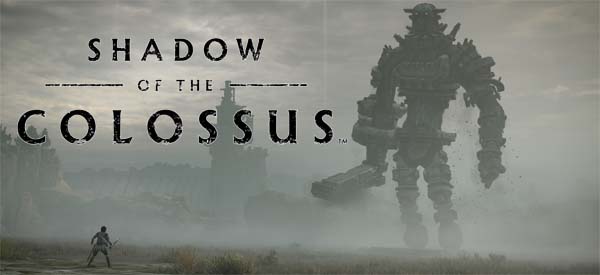
I debated whether to turn this into a retro review of Shadow of the Colossus, or to focus this review on whether or not this particular remake manages to re-capture the magic of the original. Honestly though, what could I possibly say about Shadow of the Colossus that hasn't already said? I might as well try to write a retro review of Citizen Kane or Hamlet!
The original game (released in 2005 by Fumito Ueda's Team Ico at Sony) is a classic and a masterpiece of interactive art. It ranks right up there with games like Portal, Half-Life, Super Mario Bros., and Tetris as a contender for the title of "best video game ever made". Virtually every creative decision that the original team made was the absolute perfectly right decision to make. From the desolate and bleak, yet hauntingly-beautiful landscape. To the immense sens of scale and grandeur that embodies almost every crevice of the game and the sheer smallness of the protagonist himself. To the intimidating, yet majestic aesthetic design of the colossi themselves. To the bittersweet death animations of the Colossi, accompanied by Kow Otani's outstanding score, that makes you question the rightness of your actions. To the way that Agro's independent actions, slightly imprecise controls, and occasional insubordination sell the idea that she's an autonomous living character, rather than a simple vehicle that you pilot as an extension of the player avatar. To the decision to not drag down the game's pace or pollute the overworld with a single encounter with grunt enemies. And on and on...
Shadow of the Colossus was like a digital vacation when it was released in 2005.
It's as perfect a video game as has ever been made. It's the centerpiece of any "games as art" argument (if we still even have to have that argument anymore). Critics and analysts before me have already consecrated Shadow of the Colossus far beyond my petty powers to add or detract.
Bluepoint is the masters of remasters and remakes
Why couldn't Bluepoint have done
the Silent Hill HD Collection?!
Because of how absolutely brilliant the original game is, I had reservations about any attempt to remaster or remake it, especially after the debacle that was Hijinx Studios' Silent Hill HD Collection. Fortunately, however, the remake privilege (or burden, depending on how you want to look at it) was given to Bluepoint Games, the veritable masters of remasters and HD collections. Bluepoint had already released an HD remaster of Shadow of the Colossus on the PS3 back in 2011. I never played it because I thought the PS2 version of the game still looked fantastic and didn't need to be remastered to be enjoyed. That HD remaster was very well-received by the general public, as have been all of Bluepoint's remasters, as far as I am aware. Why couldn't Konami have given Silent Hill to these folks?! [More]
a697dbc5-0ae9-4d08-b310-36e7131bc0ae|2|5.0
Tags:Shadow of the Colossus, Bluepoint Games, Team Ico, Fumito Ueda, Kow Otani, PlayStation 2, PlayStation 4, remake, remaster, colossus, open world, puzzle, platformer, horse, Agro, Wander, Dormin, trophy
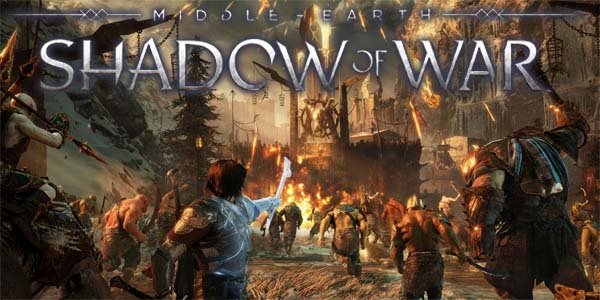
Dang. I was really hoping to have this out before the end of the year...
Shadow of Mordor was easily one of my favorite games of 2015, and one of my best reviewed games of that year, and I even cited it as an example of successful open world game mechanics. I've praised the game for its tightly-focused design, relatively limited scale, and the fact that it didn't waste the player's time with an excess of meaningless collectible hunts.
"The developers showed plenty of restraint in many areas of design so that they could focus on the innovative new feature that everything in the game revolves around. The design is tight and streamlined. They didn't waste the player's time with an excessively large, complicated map, or a multitude of irrelevant mini-games and side quests."
- from my Middle-Earth: Shadow of Mordor review
Yes, the original game did have some collectible hunts. It did have some filler content. It did have bullshit, game-y missions with arbitrary win/loss conditions. But those issues weren't pervasive enough to bring down the game as a whole, and the game generally flowed very smoothly. In their quest to mindlessly monetize the sequel, Shadow of War, Warner Brothers and Monolith have doubled down on both the best elements and the worst elements of Shadow of Mordor, and the result is beautiful when it works, and ugly when it doesn't.
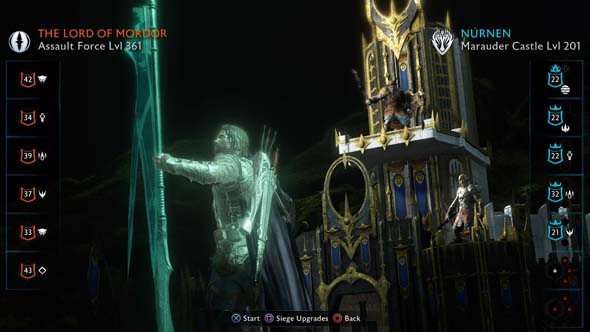
You now recruit orc captains to defend fortresses from Sauron's army.
The biggest problem is that the game now feels like a grind. In order to get you to pay for in-game, randomized micro-transactions called "War Chests", the campaign has been needlessly padded-out. Instead of having the option to hunt down uruk captains for the utilitarian purposes of gaining intel or gathering an army of mind-controlled slaves to do your bidding, you now must recruit orc captains into your own army in order to siege and then defend castles and fortresses from Sauron's counter-invasion. In principle, this sounds like a brilliant idea! I've often criticized open world and sandbox games for not having actual threats or consequences that pressure the player into acting. In fact, requiring that the player defend and hold captured strongholds from enemy counter-attacks is exactly the sort of thing that I've proposed as a compelling way to keep the game world feeling alive, and to keep the villain actually feeling threatening and antagonistic.
The problem is that (aside from one scripted castle defense) all the castle defending is back-loaded into the final act of the game. At this point, the plot is basically over, ... [More]
ae89c159-d700-491f-810c-2ed2093b5137|0|.0
Tags:Middle Earth: Shadow of War, Middle Earth: Shadow of Mordor, the Lord of the Rings, Monolith Productions, Warner Brothers Interactive Entertainment, J.R.R. Tolkien, Talion, Celebrimbor, orc, undead, wraith, elf, Middle Earth, Sauron, Shelob, Brûz The Chopper, action, open world, sandbox, parkour, RPG, micro-transaction, war chest, loot box, eBay
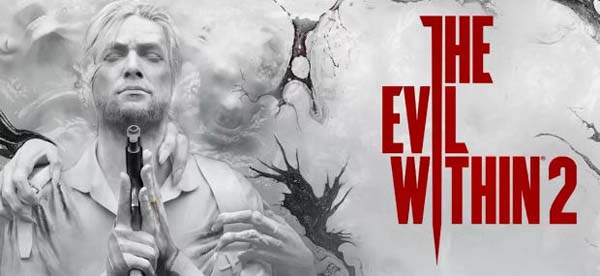
Okay, I said I would give up on Shinji Mikami after the first Evil Within game, but here I am giving that IP a second chance. I had heard that the expansions for Evil Within were actually pretty good, and that they even made the base game better by filling in some of the narrative gaps. But I was so furious with the base game that I sure as hell was not going to shell out more money for DLCs. If they were that integral to the core game, then they should have been included with the core game. Now that my furor over the original has faded a bit, I was hearing that the sequel is also much better than the original game and leans more heavily in the horror camp than the action shooter camp. I was dismissive of the game's announcement, and I was skeptical of the claims that the sequel was actually good, so I picked up a [relatively] cheap used copy off eBay so that I could give it a chance over the Halloween week without necessarily giving any more money to Bethesda.
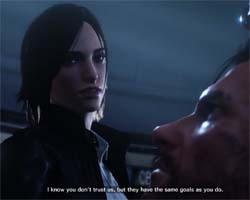
I feel like I missed something...
Maybe I should've played the DLC?
Besides, Shinji Mikami isn't the director this time around. Instead the sequel is directed by John Johanas, who was the director of the [supposedly] good DLC expansion packs. The first game actually did have some good ideas and set pieces within, so maybe a different directorial approach could bring those ideas out to their full potential?
A more focused package
To Johanas' credit, the game, as a whole, definitely has a more "unified" presentation. The first game felt very scattershot with regard to how it wanted the player to play. It's early chapters (which were also the most enjoyable parts of the game) were focused mostly on stealth, with a few pursuit and escape moments thrown in. It was slow, somewhat atmospheric, and built incredible tension. But those mechanics were quickly dropped in favor of shooting gallery set pieces, constant scripted ambushes, set piece boss encounters, and frantic, funhouse-ish trap / puzzle rooms. The sequel, thankfully, is much more focused. I didn't feel like I was wasting my resources by putting points into Sebastian's stealth skills (a skill tree that was completely absent from the previous game), as you can actually continue to use them over the course of the entire game. Sure, there's still scripted ambushes and puzzle rooms, but the focus is much more firmly planted in sneaking around, exploring the environments, and generally avoiding detection.
Unfortunately, there's still a bit too much of a focus on frenzied action. It detracts significantly from any sort of horror or tension that the game might be trying to build up. The autosaves are fairly generous (even though there are also manual save points in each of the game's safe houses), so enemies come in hordes, hit very hard, and deaths are going to happen. Chapter 3 basically completely desensitized me to death and put me in the habit of just standing up and letting the monsters kill me if I ever screwed up the stealth.
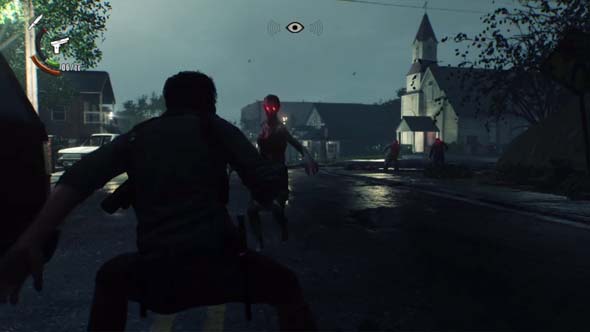
The early combat encounters are not gentle, as they put you up against hordes of enemies.
There's a greater focus on open-ended exploration this time around, and Chapter 3 is the first open map that the player is free to explore. There's basically two main paths through it: the hard one and the easy one. The easy path is basically a straight line due north from where you start, but the game throws some curveball objectives at you that basically encourage you to try the other paths that end up being much harder. You're told about weapon caches and NPCs that you're supposed to try to save. One such weapon is the crossbow, which is actually a pretty necessary tool (because, you know, every game has to have a crossbow). It's right off to the side of where you start, but picking it up can easily lead you down a much harder path to your actual mission objective... [More]
a80e28ec-25a4-48ed-8bdc-50264cab70ac|1|4.0
Tags:The Evil Within, The Evil Within 2, Bethesda, Tango Gameworks, survival horror, horror, action, shooter, open world, sandbox, stealth, zombies, mental institution, virtual reality, psychopath, Sebastian Castellanos, eBay, John Johanas, Shinji Mikami, Resident Evil, Silent Hill
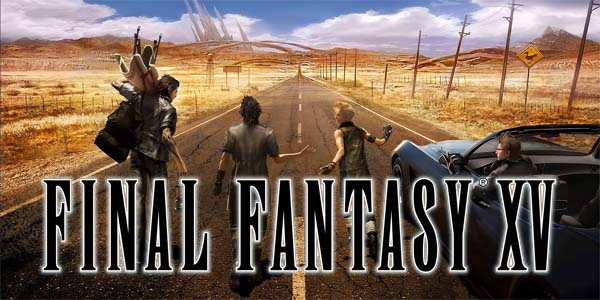
I really don't know what to make of Final Fantasy XV. On the one hand, the game is trying to do something new and kind of interesting with the long-stale open world formula. I desperately want to be able to celebrate the game for these new ideas. That being said, the game just completely blunders so much of its fundamental design, and it tramples on many of these promising new ideas by falling back on too many of the very same tropes that have killed so many other open world games.
The obvious common criticism of the game is that it's got too much of the player just sitting in the car waiting. You don't even have to drive the damned thing, as you can set one of the NPCs in your entourage to do all the driving for you. And even if you do decide to take the wheel, the car drives itself. You just press the gas, and the car automatically steers itself to stay on the road. You can't even turn off of the road even if you want to.
You know what? I'm actually OK with that.
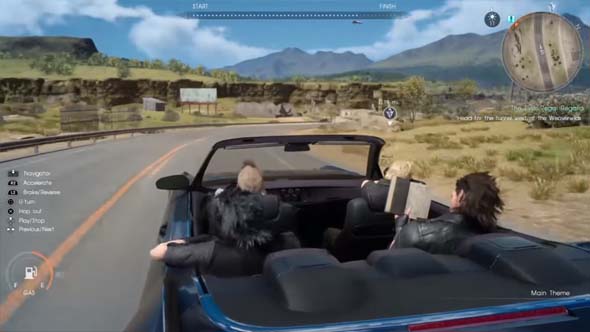
I actually don't mind the long drives, as I can catch up on some reading along with Gladiolus
A nostalgic road trip adventure
You see, having such restrictive travel mechanics actually forces the player to think more about how you're going to navigate the world. While in the car, you are confined to the game's roads and highways. You can't just point the car directly at your objective marker and drive off-road in a straight line to get there. You're also limited to traveling during the daylight hours, and you have to make sure that you budget the time and money to stop for gas and lodgings. There's a genuine amount of logistical planning required for accomplishing virtually any task in this game. You have to think about traversing this world in the same manner that the characters would have to think about it! This is a role-playing game, after all, isn't it? So these travel mechanics are actually pretty clever ways of putting the player in a role-playing mindset and giving you a game to play when you're outside of combat.
I get the feeling that Square-Enix wanted Final Fantasy XV to emulate being on a road trip. You spend large chunks of time sitting in the car driving across the countryside, passing rest stops, scenic overlooks, and roadside diners. You stop every so often to admire the view, take a walk through nature, or chat with the locals. When the sun sets, you are pressured to find a motel to bunk in, or to set up a camp site if you happen to be on foot.
For brief periods of time, this game hits a very serene high in which you start to feel like you're really in this world and with these people, as they sit bored in the car, or eat dinner over a campfire while going over the photos that they took of the day's adventure. It's the same sort of feeling that No Man's Sky hits in its early hours, when you're still awestruck by the sheer size and scope of the new planets you set foot on. Having been someone who used to take annual road trips with my family to visit national parks around the country, seeing a video game try to simulate and systemize that activity (and the human bonding that it engenders) is genuinely endearing and makes me more than a little bit nostalgic.
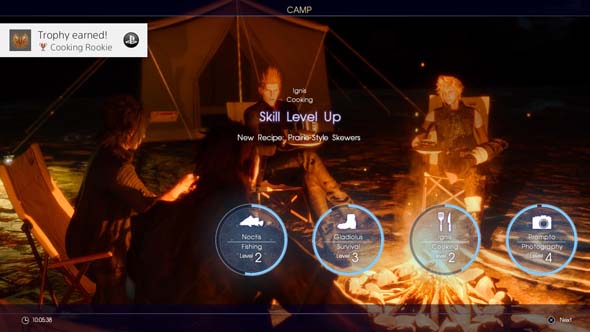
This game makes me nostalgic for the summer camping trips of my youth.
Mundane video game adventure
But then, much like No Man's Sky, Final Fantasy XV shatters that experience by forcing you back into "video game land". It isn't the long stretches of non-interactive driving through a video game vacation that bothers me. Instead, I'm bothered by the sheer tediousness of the mundane fetch quests and busy-work that the game throws at you. You see, a road trip -- and an adventure in general -- only really works if you're always traveling towards a destination. This is a feeling that Final Fantasy X completely nailed!... [More]
8a140761-e4af-4f96-967f-0ee072bf1484|1|5.0
Tags:Final Fantasy, Final Fantasy XV, Square-Enix, RPG, JRPG, open world, road trip, camping, Regalia, car, driving, chocobo, Noctis, Ignis, Gladiolus, Prompto, recipe
|

| 12 | | | | | | | 60 | | 11 | | | | | | | 55 | | 10 | | | | | | | 50 | | 09 | | | | | | | 45 | | 08 | | | | | | | 40 | | 07 | | | | | | | 35 | | 06 | | | | | | | 30 | | 05 | | | | | | | 25 | | 04 | | | | | | | 20 | | 03 | | | | | | | 15 | | 02 | | | | | | | 10 | | 01 | | | | | | | 05 |
|